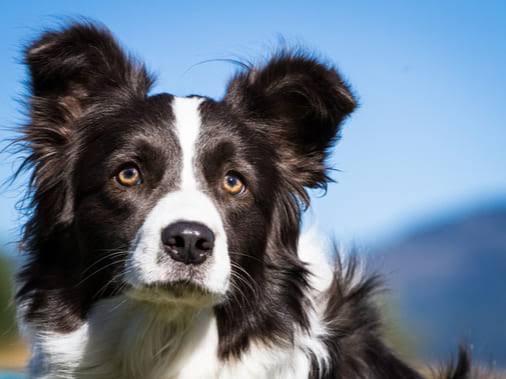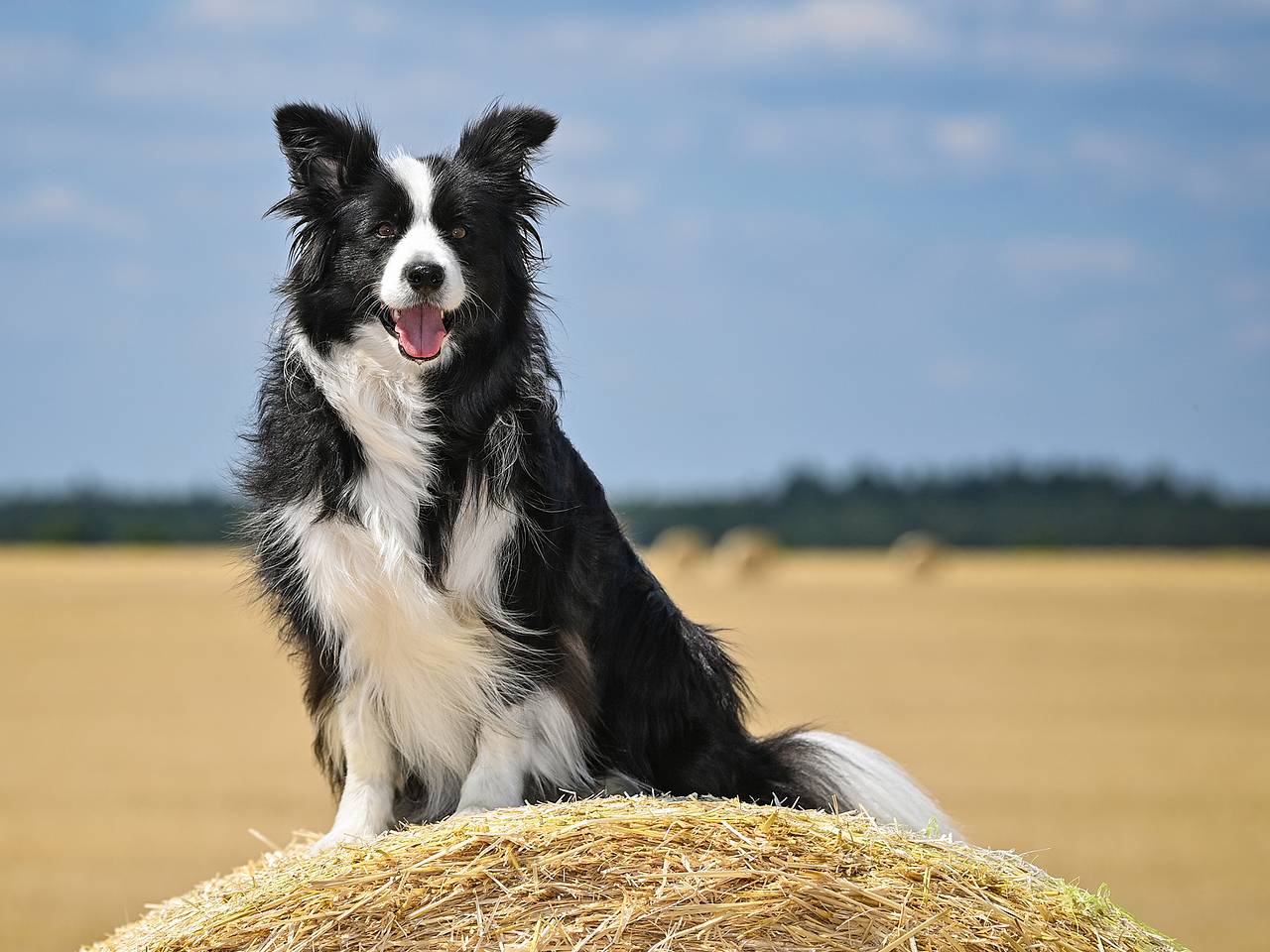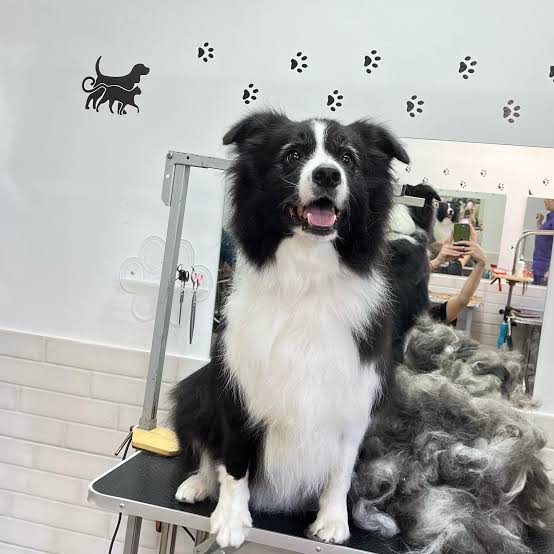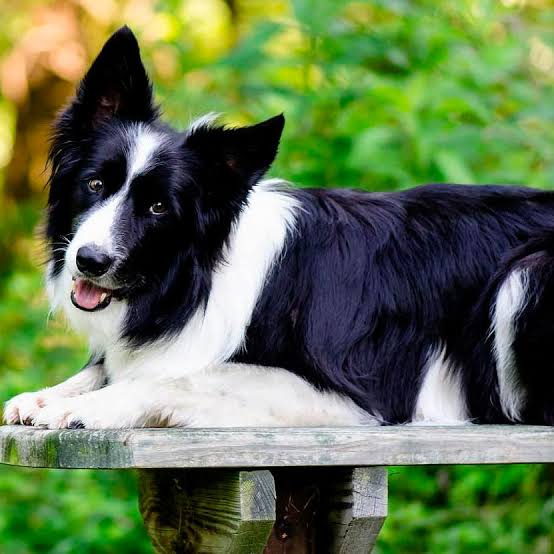🐕 Are Border Collies Hypoallergenic? No, here's why❌ Quick Answer: No, Border Collies are NOT hypoallergenic Border Collies have a moderate to high shedding double coat that releases significant amounts of dander and fur throughout the year, with heavy seasonal shedding during spring and fall. Their coat produces the allergen proteins (Can f 1 and Can f 2) found in saliva, dander, and urine that trigger allergic reactions in sensitive individuals.

Border Collies are beloved for their intelligence and striking appearance, but their double coat produces significant allergens 🐾 Understanding the Border Collie BreedThe Border Collie is widely recognized as one of the most intelligent dog breeds in the world 🧠. Originally bred in the border region between Scotland and England, these remarkable dogs were developed for herding sheep across rugged terrain. Their exceptional work ethic, incredible focus, and boundless energy have made them not only outstanding working dogs but also beloved companions for active families. 
Border Collies thrive in active environments where their herding instincts and intelligence can shine Border Collies are medium-sized dogs with athletic builds perfectly suited for their original purpose. They possess a distinctive appearance with alert, expressive eyes that seem to analyze everything around them. Their intense gaze, known as "the eye," is a characteristic trait used when herding livestock. These dogs come in various color combinations, with black and white being the most common, though they can also be red, blue merle, sable, or tricolor. 📊 Border Collie Quick FactsShedding Level: Moderate to High 🔴
Hypoallergenic: No ❌
Weight: 14-20 kg (30-45 lbs)
Height: 46-56 cm (18-22 inches)
Coat Type: Double Coat
Exercise Needs: Very High 🏃♂️
Intelligence: Exceptional ⭐⭐⭐⭐⭐
Grooming: Regular Required ✂️
What makes Border Collies truly special is their unmatched intelligence and trainability. They consistently rank as the number one most intelligent dog breed, capable of learning new commands with just a few repetitions. This mental acuity, combined with their physical prowess, makes them excel in various canine sports including agility, obedience, flyball, and disc dog competitions 🏆. 
Border Collie puppies are adorable bundles of energy that grow into highly intelligent working dogs 🔬 What Makes a Dog Breed Hypoallergenic?Before discussing why Border Collies aren't hypoallergenic, it's essential to understand what hypoallergenic actually means in the context of dog breeds. The term "hypoallergenic" suggests that something is less likely to cause allergic reactions, though it's important to note that no dog breed is 100% hypoallergenic 🚫. Dog allergies are not actually caused by fur itself, but by proteins found in a dog's dander (dead skin cells), saliva, and urine. The primary allergens are Can f 1 and Can f 2 proteins. When dogs shed their fur, these allergens become airborne and settle on surfaces throughout the home, triggering allergic reactions in sensitive individuals. 🔑 Key Characteristics of Hypoallergenic Breeds:
Breeds considered hypoallergenic typically have coats that trap dander close to the skin rather than releasing it into the air. Examples include Poodles, Portuguese Water Dogs, and Bichon Frises, which have curly, continuously growing hair that requires regular grooming but sheds minimally. ↑ Back to Menu❌ Why Border Collies Are NOT HypoallergenicBorder Collies possess several characteristics that make them definitively not hypoallergenic. Understanding these factors is crucial for anyone with allergies who is considering this breed. 
Regular grooming is essential for Border Collies, but their double coat still produces significant allergens 🧥 Double Coat StructureBorder Collies have a weather-resistant double coat consisting of two distinct layers. The dense, soft undercoat provides insulation, while the longer, coarser outer coat (guard hairs) repels water and protects against the elements. This double coat system, while excellent for a working dog in various climates, means double the dander production and significantly more shedding than single-coated breeds. 🍂 Heavy Seasonal SheddingBorder Collies experience intense seasonal shedding twice a year - typically in spring and fall. During these periods, known as "blowing their coat," they shed their undercoat heavily to adapt to temperature changes. This process can last several weeks and results in substantial amounts of fur and dander being released into your living environment. Even outside these peak seasons, Border Collies shed moderately throughout the year. 🦠 High Allergen ProductionThe Can f 1 protein (the primary dog allergen) is produced in Border Collies' skin and sebaceous glands. Because they have a double coat with significant surface area and active oil production to maintain coat health, they produce and distribute higher levels of allergens compared to single-coated or low-shedding breeds. 💦 Saliva and Grooming BehaviorBorder Collies are active dogs that engage in regular self-grooming. When they lick their fur, allergen-containing saliva spreads throughout their coat. As this saliva dries, it becomes airborne with the dander, creating additional allergen exposure for sensitive individuals. ⚠️ Important Note for Allergy Sufferers: If you or someone in your household has moderate to severe dog allergies, a Border Collie is not a suitable choice. The combination of their double coat, regular shedding, and active lifestyle means they produce and distribute significant amounts of allergens throughout your home. This is true regardless of how frequently you groom them or clean your living space. 
Border Collies' active lifestyle means allergens spread throughout both indoor and outdoor spaces 🤧 Living with a Border Collie When You Have AllergiesWhile Border Collies are not recommended for people with significant dog allergies, some individuals with mild allergies have successfully shared their lives with these remarkable dogs. The key is understanding what you're committing to and implementing comprehensive management strategies 🏠. 🩺 Assessing Your Allergy SeverityBefore considering a Border Collie, it's crucial to honestly evaluate your allergy symptoms. Mild allergies might include occasional sneezing or minor eye irritation that resolves quickly. However, if you experience difficulty breathing, severe congestion, skin rashes, or symptoms that significantly impact your daily life, a Border Collie is not the right choice, no matter how much you love the breed. 💡 Realistic Expectations: Even with the most diligent management routine, living with a Border Collie while having allergies means you will be exposed to allergens daily. The question isn't whether you'll encounter allergens, but whether your symptoms remain manageable and don't compromise your quality of life or health. 
Indoor time means allergen accumulation in your living spaces - proper management is essential 🏡 Environmental ManagementCreating an allergy-managed home environment requires consistent effort and investment. This includes using HEPA air purifiers in main living areas and bedrooms, installing HEPA filters in your HVAC system, and replacing them regularly. Hard flooring is preferable to carpet, as allergens are much easier to remove from hard surfaces. If you have carpets, they require professional cleaning every 3-4 months. Establishing "dog-free zones" in your home, particularly bedrooms, provides allergen-reduced spaces where you can recover from exposure. Regularly washing all bedding, curtains, and upholstered furniture covers in hot water helps control allergen accumulation 🧼. 🚿 Bathing and Grooming ProtocolRegular bathing can help reduce the amount of dander and allergens on your Border Collie's coat. However, there's a balance to strike - bathing too frequently (more than once every 3-4 weeks) can dry out their skin and actually increase dander production. Use a veterinarian-recommended hypoallergenic shampoo designed to minimize allergens. Daily brushing outdoors is essential during shedding seasons and beneficial year-round. This practice removes loose fur and dander before they spread through your home. The person doing the grooming should ideally not be the one with allergies, or should wear a mask and wash thoroughly afterward. ↑ Back to Menu
A healthy diet supports coat health, though it won't make Border Collies hypoallergenic 🔄 Hypoallergenic Alternatives to Border ColliesIf you're drawn to Border Collies but need a more allergy-friendly option, several breeds offer similar characteristics while being better suited for allergy sufferers. While no breed perfectly replicates the Border Collie's unique combination of traits, these alternatives share some of their appealing qualities 🐩. Intelligent and Active Hypoallergenic Breeds
🐩 Standard Poodle - The Intelligent AthleteOften underestimated due to their fancy appearance, Standard Poodles are exceptionally intelligent and rank second only to Border Collies in canine intelligence studies. They were originally bred as water retrievers and possess impressive athletic ability and trainability. Their curly, non-shedding coat makes them an excellent choice for allergy sufferers, though they require regular professional grooming every 6-8 weeks. Poodles excel in various dog sports and can satisfy the desire for an active, trainable companion. 🌊 Portuguese Water Dog - The Working PartnerPortuguese Water Dogs share the Border Collie's working dog heritage and high energy levels. Originally bred to assist fishermen, these dogs are highly intelligent, eager to learn, and thrive on having a job to do. Their wavy or curly coat sheds minimally and produces less dander than double-coated breeds. They require substantial exercise and mental stimulation, making them suitable for the same active lifestyle that appeals to Border Collie enthusiasts. 💧 Spanish Water Dog - The Herding AlternativeThe Spanish Water Dog is perhaps the closest hypoallergenic alternative to Border Collies in terms of herding instinct and working ability. These versatile dogs were traditionally used for herding sheep and cattle in Spain. They possess strong work ethics, high intelligence, and athletic builds. Their curly, woolly coat doesn't shed traditionally but does require regular maintenance. They maintain the intense focus and trainability that makes Border Collies so appealing. 🎯 Choosing the Right Alternative: While these breeds offer hypoallergenic advantages, they still require significant time, training, and exercise commitments. Consider spending time with each breed before deciding, and remember that individual dogs within breeds can vary in both temperament and allergen production. 
Border Collies are beautiful in every season, but their seasonal coat changes mean increased allergen production 💡 Tips for Border Collie Owners with Mild AllergiesFor those who decide to proceed with Border Collie ownership despite mild allergies, implementing a comprehensive management strategy is essential. These practices won't eliminate allergens but can help minimize exposure and symptoms 🛡️. 🧹 Daily Cleaning RoutineEstablish a consistent daily cleaning schedule that includes vacuuming with a HEPA-filter vacuum cleaner. Focus on areas where your Border Collie spends the most time. Damp mopping hard floors traps allergens more effectively than dry sweeping. Use microfiber cloths for dusting, as they capture particles rather than dispersing them into the air. During heavy shedding seasons, increase vacuuming frequency to twice daily in high-traffic areas. 🌬️ Air Quality ManagementInvest in high-quality HEPA air purifiers for your main living areas and bedroom. These devices should run continuously, not just when symptoms appear. Open windows regularly (weather permitting) to increase ventilation and reduce allergen concentration. Consider using exhaust fans when grooming your dog to pull airborne particles outside. 
Winter coats bring additional challenges for allergy management as dogs spend more time indoors ✂️ Professional Grooming SupportWhile regular home grooming is necessary, professional grooming every 6-8 weeks provides thorough coat care and allergen reduction. Professional groomers have specialized equipment like high-velocity dryers that remove loose undercoat more effectively than home brushing. Some groomers offer deshedding treatments that can reduce shedding for several weeks. Always have grooming performed outside your home when possible, so the bulk of allergens don't accumulate in your living space. 💊 Medical ManagementWork with your allergist to develop an appropriate medication plan. This might include daily antihistamines, nasal corticosteroid sprays, or other allergy medications. Some people benefit from allergy immunotherapy (shots or sublingual tablets), which can reduce sensitivity over time. However, this is a long-term commitment that takes several years to achieve maximum effectiveness. Never rely solely on medication without implementing environmental controls. 🧴 Personal Hygiene PracticesAfter interacting with your Border Collie, wash your hands and face before touching your eyes or face. Change clothes and shower before bed if you've had extended contact with your dog. Keep hand sanitizer accessible for quick cleaning when thorough washing isn't immediately possible. These simple habits significantly reduce allergen transfer to sensitive areas. 🍽️ Nutrition and Coat HealthA high-quality diet rich in omega-3 fatty acids supports healthy skin and coat condition, which can minimize excessive dander production. Consult your veterinarian about supplementation if needed. Proper nutrition won't make your Border Collie hypoallergenic, but it can help maintain optimal coat health and potentially reduce some allergen production associated with skin irritation or poor coat quality. ⏰ Time and Financial Commitment: Managing allergies while living with a Border Collie requires significant ongoing investment in cleaning supplies, air filtration systems, professional grooming, and potentially medical care. Be realistic about whether you can maintain this level of commitment for the 12-15 year lifespan of the dog. 
Even during relaxation time, Border Collies continuously shed and produce allergens 🔍 Find Your Perfect Hypoallergenic CompanionIf you're discovering that a Border Collie might not be the right match due to allergy concerns, don't worry! There are many wonderful hypoallergenic breeds that could be perfect for your lifestyle. Our interactive breed selector takes into account your specific needs, living situation, and allergy sensitivity to recommend the best matches for you and your family. Answer a few quick questions and find the perfect allergy-friendly breed for your home in under 2 minutes! 🏡 🧪 Testing Before Adopting a Border CollieIf you have allergies but are seriously considering a Border Collie, thorough testing before commitment is absolutely essential. This process helps you make an informed decision and prevents the heartbreak of having to rehome a dog after forming an attachment 💔. 🏥 Medical Allergy TestingStart by consulting with an allergist for comprehensive allergy testing. Skin prick tests or blood tests can confirm whether you're specifically allergic to dogs and identify the severity of your sensitivity. Some people are allergic to certain dog breeds more than others, though Border Collies' high allergen production makes them challenging for most dog allergy sufferers. Understanding your specific allergen sensitivities helps you make an informed decision. 👨👩👧👦 Extended Exposure TestingArrange to spend significant time with Border Collies before making a commitment. A brief visit to a breeder or shelter isn't sufficient - you need extended exposure in various settings. Try to:
🏠 Foster-to-Adopt ProgramsSome rescues and organizations offer foster-to-adopt arrangements that allow you to live with a Border Collie temporarily before finalizing adoption. This trial period provides invaluable information about how your allergies respond to daily, prolonged exposure in your actual living environment. It's the most reliable way to determine whether you can manage your symptoms long-term. ⚠️ Red Flags to Stop and Reconsider:
If you experience any of these symptoms, a Border Collie is not safe for your health, regardless of how much you love the breed. 📝 Realistic Self-AssessmentBe honest with yourself about your willingness and ability to maintain rigorous allergy management protocols for potentially 12-15 years. Consider questions like: Can you afford professional grooming every 6-8 weeks? Will you consistently vacuum daily and maintain air purifiers? Can you commit to keeping the dog out of bedrooms permanently? Are you prepared for symptoms during heavy shedding seasons? If the answer to any of these is uncertain, it may be wiser to choose a more suitable breed. ↑ Back to Menu❓ Frequently Asked QuestionsNo, Border Collies are not hypoallergenic. They have a double coat that sheds moderately year-round with heavy seasonal shedding twice annually. This produces significant amounts of dander and allergen proteins (Can f 1 and Can f 2) that trigger allergic reactions in sensitive individuals. Their coat structure and shedding pattern make them unsuitable for people with dog allergies. Border Collies are moderate to heavy shedders. They shed consistently throughout the year, with two intense seasonal shedding periods in spring and fall when they "blow their coat" to adapt to temperature changes. During these peak periods, which last several weeks, you'll find substantial amounts of fur throughout your home daily, even with regular brushing. Expect to vacuum and clean frequently if you own a Border Collie. While you cannot eliminate allergens from a Border Collie, you can reduce exposure through consistent management. This includes: daily brushing outdoors, bathing every 3-4 weeks with hypoallergenic shampoo, using HEPA air purifiers and vacuum cleaners, frequent washing of bedding and surfaces, professional grooming every 6-8 weeks, and establishing dog-free zones in your home. However, these measures only reduce - not eliminate - allergen levels, and require significant ongoing time and financial investment 💰. The best hypoallergenic alternatives that share some Border Collie characteristics include: Standard Poodles (equally intelligent, athletic, trainable), Portuguese Water Dogs (high energy, working dog heritage), Spanish Water Dogs (herding background, strong work ethic), and Lagotto Romagnolo (intelligent, active, trainable). All these breeds have low-shedding coats that produce fewer airborne allergens while offering the intelligence and trainability that makes Border Collies appealing 🐩. This decision requires careful consideration and thorough testing. If you have only mild allergies, it may be possible with rigorous management, but you should: undergo allergy testing with an allergist, spend extended time with Border Collies before committing, consider foster-to-adopt programs for trial periods, honestly assess your ability to maintain strict allergen management protocols, and prepare for potentially worsening symptoms during shedding seasons. If you experience any respiratory difficulties, severe symptoms, or quality-of-life impacts, a Border Collie is not recommended regardless of how mild your initial symptoms seem ⚕️. No, this is a common misconception. While Border Collie puppies may shed less initially because they have less coat, they still produce the same allergen proteins (Can f 1 and Can f 2) in their dander, saliva, and urine. As puppies develop their full double coat at 6-12 months of age, allergen production actually increases. If you're allergic to adult Border Collies, you'll eventually be allergic to the puppy too. Never adopt a puppy hoping to "build immunity" - this rarely works and often results in heartbreak 💔. For allergen management, Border Collies should be brushed daily (outdoors if possible) to remove loose fur and dander before it spreads through your home. Bathing should occur every 3-4 weeks using hypoallergenic dog shampoo - more frequent bathing can dry their skin and increase dander production. Professional grooming every 6-8 weeks helps remove undercoat thoroughly. During heavy shedding seasons (spring and fall), increase brushing to twice daily. Remember, even with perfect grooming, Border Collies will still produce substantial allergens ✂️. No, coat color has no impact on allergen production. Whether your Border Collie is black and white, red and white, blue merle, or any other color combination, they all have the same double coat structure and produce equivalent amounts of allergen proteins. The myth that certain colors are "better" for allergies is unfounded. Allergen production is determined by coat type (double vs. single), shedding patterns, and individual protein production - not by the pigmentation of the fur 🎨. 🎯 Final Thoughts: Making an Informed DecisionBorder Collies are truly exceptional dogs - their intelligence, athleticism, and dedication make them one of the most remarkable breeds in the canine world 🌟. However, their double coat and significant shedding mean they are definitively not hypoallergenic and are not suitable for most people with dog allergies. If you have dog allergies and are drawn to the Border Collie's characteristics, we strongly encourage you to explore hypoallergenic alternatives like Standard Poodles, Portuguese Water Dogs, or Spanish Water Dogs. These breeds offer similar intelligence, trainability, and energy levels while producing significantly fewer allergens. For those with only mild allergies who are determined to own a Border Collie, success requires unwavering commitment to allergen management, significant financial investment in grooming and air filtration, and realistic expectations about symptom management. Always test extensively before making a commitment, and prioritize your health and wellbeing above all else. Remember, choosing the right dog breed is about finding the best match for your lifestyle, health needs, and capabilities. There's a perfect dog out there for everyone - and for allergy sufferers, that dog is much more likely to be a hypoallergenic breed than a Border Collie. Your future canine companion should enhance your life, not compromise your health or create ongoing stress 💚. 🏆 The Bottom Line: Border Collies are wonderful dogs, but they are NOT hypoallergenic. If you have dog allergies, explore truly hypoallergenic breeds that can offer you a fulfilling relationship without the constant battle against allergens. Your perfect match is out there - and it might just surprise you! | |||||||||||||||||||||||||||||||||||||||||||
|
| |||||||||||||||||||||||||||||||||||||||||||
| Переглядів: 76 | | | |||||||||||||||||||||||||||||||||||||||||||
| Total comments: 0 | |
